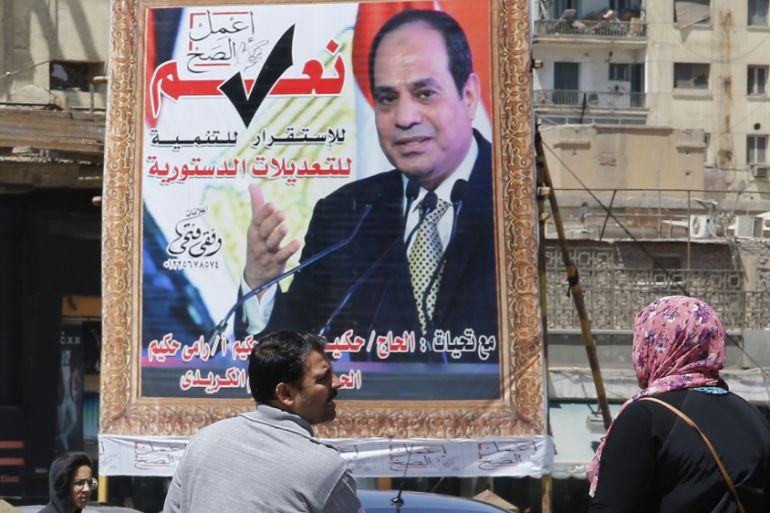Egypt opposition urges voters to reject constitutional amendments
Political parties say changes, which could extend Sisi’s rule to 2030, are an ‘assault on democracy’.

A coalition of opposition political parties has called on Egyptian voters to reject proposed constitutional amendments that could allow President Abdel Fattah el-Sisi to stay in power until 2030.
The Civil Democratic Movement, which includes liberal and left-leaning parties, decried the amendments on Thursday, calling them an “assault on democracy” and urged people to break the “barrier of silence” and participate in the referendum by voting “No”.
Keep reading
list of 4 itemsTurkey and Egypt call for ceasefire in Gaza
Turkey’s Erdogan, Egypt’s Sisi meet in Cairo
Turkey’s Erdogan arrives in Egypt for first visit in more than a decade
“We want people to go and say no,” said Abdel-Aziz al-Husseini of the Karam party.
The three-day referendum on the proposed changes will begin on Saturday.
The dates were announced less than 24 hours after parliament, packed with Sisi’s supporters, overwhelmingly approved the proposed amendments.
In general terms, the changes extend a president’s term in office from four to six years and allow for a maximum of two terms.
|
|
But they also include a special article specific to Sisi that extends his current second four-year term to six years and allows him to run for another six-year term in 2024 – potentially extending his rule until 2030.
The move comes eight years after a pro-democracy uprising ended Hosni Mubarak’s three-decade rule, and nearly six years after Sisi led a popular military overthrow of the country’s first freely elected President Mohamed Morsi, after protests against his rule.
‘Absolute dictatorship’
Speaking to reporters on Thursday, Khaled Dawood, an opposition leader and former head of the liberal Dostour, or Constitution Party, said if the referendum passes, “our dream and hope to have a president who is elected once every two terms have come to an end”.
“Unfortunately, the Egyptian regime is not learning the lessons of 2011 revolution or experiences in Algeria and Sudan,” he said in reference to recent mass uprisings in Sudan and Algeria that led to the downfall of longtime rulers.
The opposition also said they were banned from hanging banners in the streets to call on voters to reject the amendments and said they have only used social media to reach out to people.
Sisi came to power in 2014 after overthrowing Morsi, who hails from the now-outlawed Muslim Brotherhood.
The 64-year-old was re-elected in March 2018 with more than 97 percent of the vote, in a ballot boycotted by large swaths of the country’s political opposition after several potential candidates dropped out citing intimidation or were arrested.
Hassan Nafaa, a political analyst, told the Associated Press news agency that the proposed amendments amount to “legalising dictatorship in the constitution and that will have dangerous repercussions on the political system when all doors for freedom of expression are sealed”.
“The adjustment will lead to absolute dictatorship,” he added.
In a statement on Tuesday, Amnesty International said the proposed constitutional amendments would “facilitate the authorities’ crackdown on freedom of expression, association and assembly, erode people’s rights, and exacerbate the human rights crisis in the country”.
“The decision to put these amendments to the constitution to a public referendum, amid the worst crackdown on freedom of expression and severe restrictions on political parties and independent media, demonstrates the Egyptian government’s contempt for the rights of all people in Egypt,” said Magdalena Mughrabi, Amnesty’s deputy director for Middle East and North Africa.